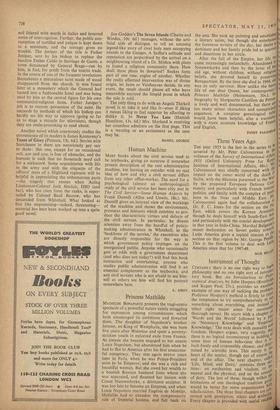Human Machine
MOST books about the civil service tend to be textbooks, giving an accurate if somewhat prosaic description of the vast administrative machine, but leaving an outsider with no real idea of how and why a civil servant differs from any other office-worker. The need for a psychological (almost an anthropological) study of the civil service has been ably met in The Civil Service—Some Human Aspects by Fraok Dunnill (Allen and Unwin, 18s.). Mr. Dunnill gives an internal view of the workings of the machine and shows the environment, pressures and interests which combine to pro- duce the characteristic virtues and defects of the civil servant. In particular, he directs attention away from the handful of policy- making administrators in Whitehall, to the 'backbone of the service,' the executives who are directly responsible for the way in which government policy impinges on the unorganised public. Anyone who occasionally gets at odds with a government department (and who does not today?) will find this book instructive and entertaining; anyone who studies public administration will find it an essential complement to the textbooks; and any civil servant who is not afraid to see him- self as others see him will find his portrait somewhere here.
L. AIREY










































 Previous page
Previous page